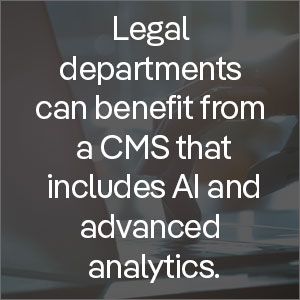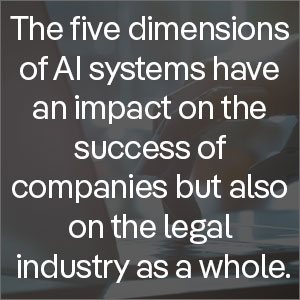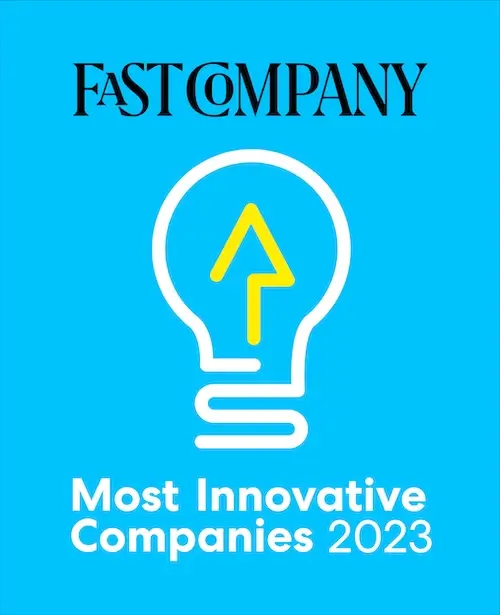Theoretical physicist and cosmologist Stephen Hawking once said that eventually, “every aspect of our lives will be transformed [by artificial intelligence].” Today, the most disruptive technology in a number of industries is cognitive computing. Not only does artificial intelligence (AI) improve upon existing software, but it also supports day-to-day functions and allows professionals to focus on more critical tasks. What’s more, digital transformation and AI afford them the time to dream up entirely new roles and responsibilities. And these will matter most in the years to come – even if they are completely unfathomable at present.
Now, let’s look at what AI in digital transformation — in all of its dimensions — truly means for general counsels (GCs) and other legal functions, in particular.
What Multidimensional AI Means to Legal Digital Transformation
The majority of legal technology solutions on the market today only include a couple of dimensions of AI. That will no longer suffice. Because of the range of core functionalities that end-to-end contract management systems (CMS) offer now, multidimensional AI should play a crucial part in legal tech platforms moving forward.
Applying advanced, proprietary algorithms, along with enhanced legal engineering capabilities, goes a long way where AI-powered contract management solutions are concerned. This holistic approach is even backed by Gartner, leading global research, as it embeds “AI into the fundamental steps of the contracting process.” This is opposed to applying AI to only “one or two specific tasks, such as automating third-party contract reviews.”
Gartner highlights vendors “that use process design, content services, and user experience to improve established legal and compliance workflows.” In its 2019 report on legal and compliance automation, it recognizes that legal departments can benefit immensely from the adoption and implementation of a CMS that includes AI and advanced analytics.
What is more, Gartner recommends that legal and compliance lead to prioritizing the achievement of critical outcomes. In other words, they should look toward improving training and validation, ensuring information compliance enterprise-wise, and accelerating contract reviews altogether.
Five Dimensions of AI Capabilities
There are five key dimensions of AI systems, which data-driven legal teams should keep top-of-mind. In fact, these are ‘must-haves as they undergo legal digital transformations of their own.
AI-Powered Obligation Management:
Using best-in-class natural language processing (NLP) technology and an embedded legal language knowledge studio, you can analyze and interpret legal obligations and automatically abstract these obligations. This cuts down any manual abstraction – or manual entry – which takes far too many human hours to complete. With AI-powered obligation management, you can also generate reports for all contractual obligations, which have been added to the system by AI tech or by hand.
Full document translation
You can translate whole agreements and related documents into a number of languages with the assistance of neural machine translation. This, while preserving much-needed context. Cognitive document translation is one of the most advanced technologies for the in-house legal department. With it, you can also make contract-related queries in whatever language you prefer. The AI translates the search into one of more than 40 languages. It then outputs results in your preferred language, together with the visualization of translated clauses within agreements.
Cognitive Discovery Search:
Including features, like auto-complete, geospatial search, filtering, and faceting capabilities, advanced cognitive searchability reads all contracts in a repository and supports all advanced searches. Built into the system are AI search capabilities beyond optical character recognition (OCR). These include enhanced key phrase extraction, fuzzy searches, text pre-population, and named entity recognition. Taking an ‘extract-and-enrich-text’ approach, the AI pulls data from undifferentiated text or image files made up of unstructured data. It then makes it indexable and retrievable during full-text search queries.
Contract Analyst Chatbot:
Proprietary chatbots are virtual contract analysts that are driven by NLP technology and AI capabilities. These chatbots, which are located at the contract record level, interpret and respond to all contract-related queries. Instead of opening legal documents every time you have a question, you can obtain reports of the responses received by the AI, before printing out and emailing these same details.
Third-Party Contract Risk and Compliance:
With element classification AI tech, you can better review third-party contracts against the pre-defined contractual playbooks of companies and customers. You can analyze these agreements, and identify risk issues and non-compliant contractual text. You can negotiate contracts more speedily and ensure superior contractual compliance. By alerting legal teams to potential exposure and “risk-scoring,” a properly-implemented, AI-based CMS assists with evaluating the dangers lurking in agreements, too.
In the contractual sense, attorneys and legal paraprofessionals need to discover, strengthen, and build upon the very best of companies. This helps to breathe new life into legal services and the business but requires exceptional contract management supported by human ingenuity and artificial intelligence. In combination, the five dimensions of AI systems not only have an impact on the successes of companies and customers but also on those of the legal industry as a whole.
So, remember what Stephen Hawking said about artificial intelligence. And think of digital transformation and AI in terms of legal’s first digital revolution.
Choose the Right CLM Partner
The latest core features of ContractPodAi can help speed up your own contract management process. Our AI-powered contract lifecycle management (CLM) solution now includes Legal DeepSights, for example. With this digital tool, in particular, you can make your legal team more efficient and effective than ever before.
For more help on choosing the right CLM partner and solution, check out our latest white paper, “How to Choose a Contract Management Solution.”
Author:

Jerry Levine
Connect with us on Linkedin











